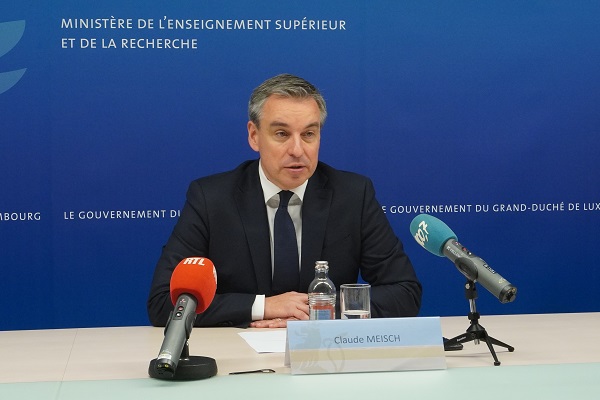 Claude Meisch, Luxembourg's Minister of Higher Education & Research;
Credit: MESR
Claude Meisch, Luxembourg's Minister of Higher Education & Research;
Credit: MESR
During a press conference on Thursday, Luxembourg's Minister of Higher Education and Research, Claude Meisch, presented the key figures for higher education for the 2020-21 academic year, including the main recommendations resulting from the fourth external evaluation of the University of Luxembourg.
In accordance with the law governing its organisation, the University of Luxembourg, created in 2003, is subject to an external evaluation every four years. The fourth evaluation, carried out in 2020-21, examined teaching activities in a systematic and in-depth manner for the first time. This assessment also addressed institutional and organisational aspects in relation to teaching activities such as governance and quality control. The evaluation, which called on more than 35 international experts and students, was carried out according to the principle of international peer review.
The main recommendations were as follows:
- It is necessary to emphasise more the importance of education in University of Luxembourg's strategic documents;
- The establishment of an institutional and integrated quality assurance system is essential. Such a system is expected to help maintain and improve the quality of teaching, expand experiences in programme accreditation and prepare the ground for institutional accreditation, develop and implement a graduate tracking system.
"The evaluations show that the development of the university justifies the annual allocations of around €200 million which constitute a real investment in the future", commented Minister Claude Meisch.
The Higher Education Minister also described the evaluation report as an important element for the establishment of the next multiannual agreement between the University of Luxembourg and the State, which will enter into force on 1 January 2022 and which will take up some of the recommendations resulting from this evaluation.
Moreover, Minister Claude Meisch presented the projects of the Ministry of Higher Education and Research which are in line with the policy of quality assurance in higher education, namely the development of a national strategy for higher education, the revision of the law on higher education and reflection at the national level on the need for training in higher education, including continuing training.
Finally, the Minister took stock of the financial aid allocated during the past academic year and presented the key figures for higher education in Luxembourg for the year 2020-21.
A total of 33,589 students were granted state financial aid (CEDIES), including 19,898 resident and 13,691 non-resident students. The Luxembourg State paid out €142.6 million in student grants and €104.1 million in student loans.
In 2020-21, the preferred country of study for resident students was once again Germany (4,776 students), followed by Luxembourg (3,989) and Belgium (3,497). The country of study which has seen the most remarkable growth in terms of attendance by students residing in Luxembourg in recent years is the Netherlands. Regarding the field of study, economics remained the subject of choice for students. As for the level of studies, 13,403 resident students were enroled in the first cycle leading to the bachelor, 5,172 in the second cycle leading to a master and 289 in the third cycle leading to a PhD.
A total of 6,783 students of 130 different nationalities were enroled at the University of Luxembourg in 2020-21, which constitutes an almost unchanged number of enrolments compared to the last three academic years.
Minister Claude Meisch also presented the key figures of training courses leading to the BTS higher technician certificate (brevet de technicien supérieur). There were 889 registrations in the 30 BTS-level courses offered in Luxembourg in 2020-21. 330 BTS certificates were awarded during the academic year in question.









